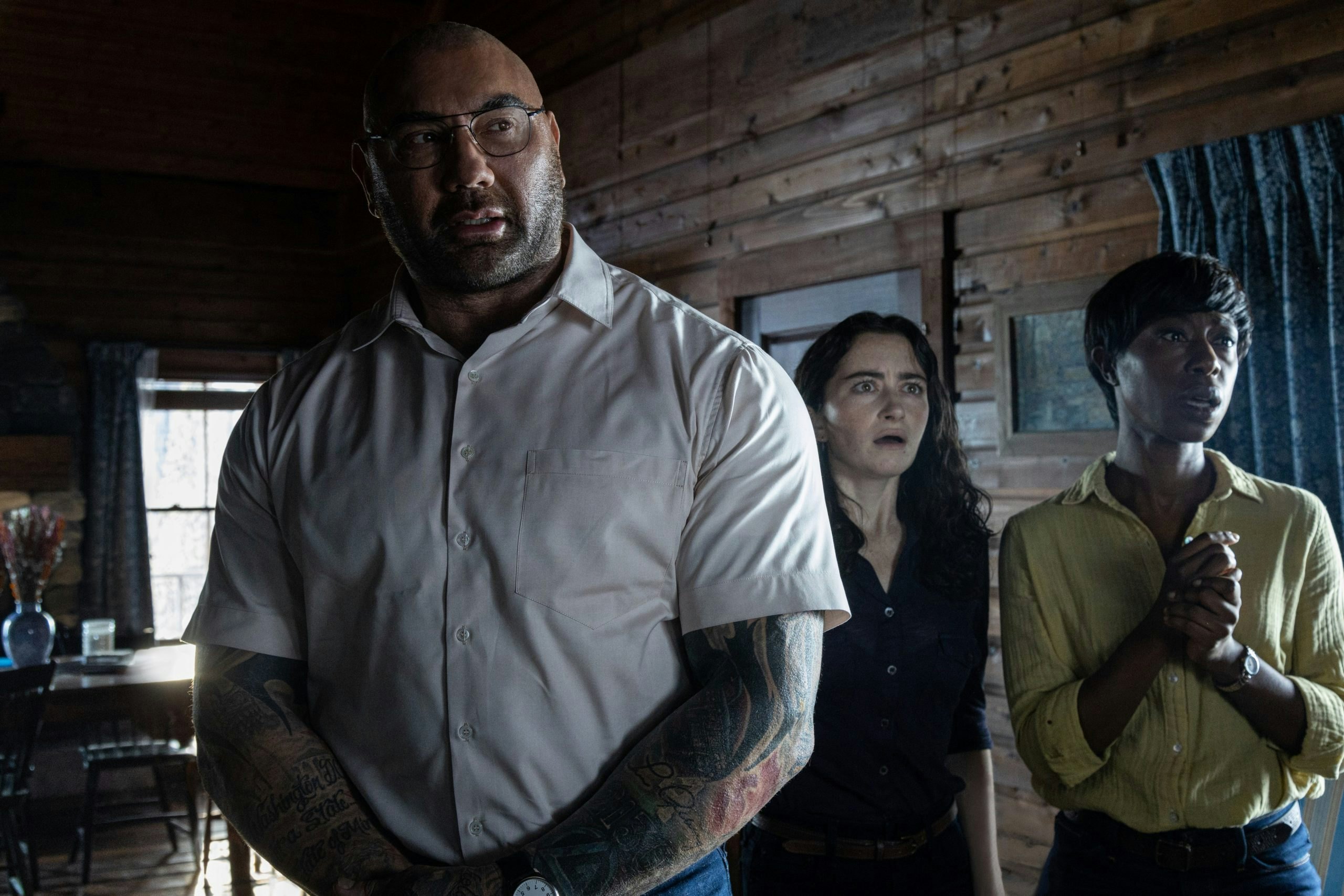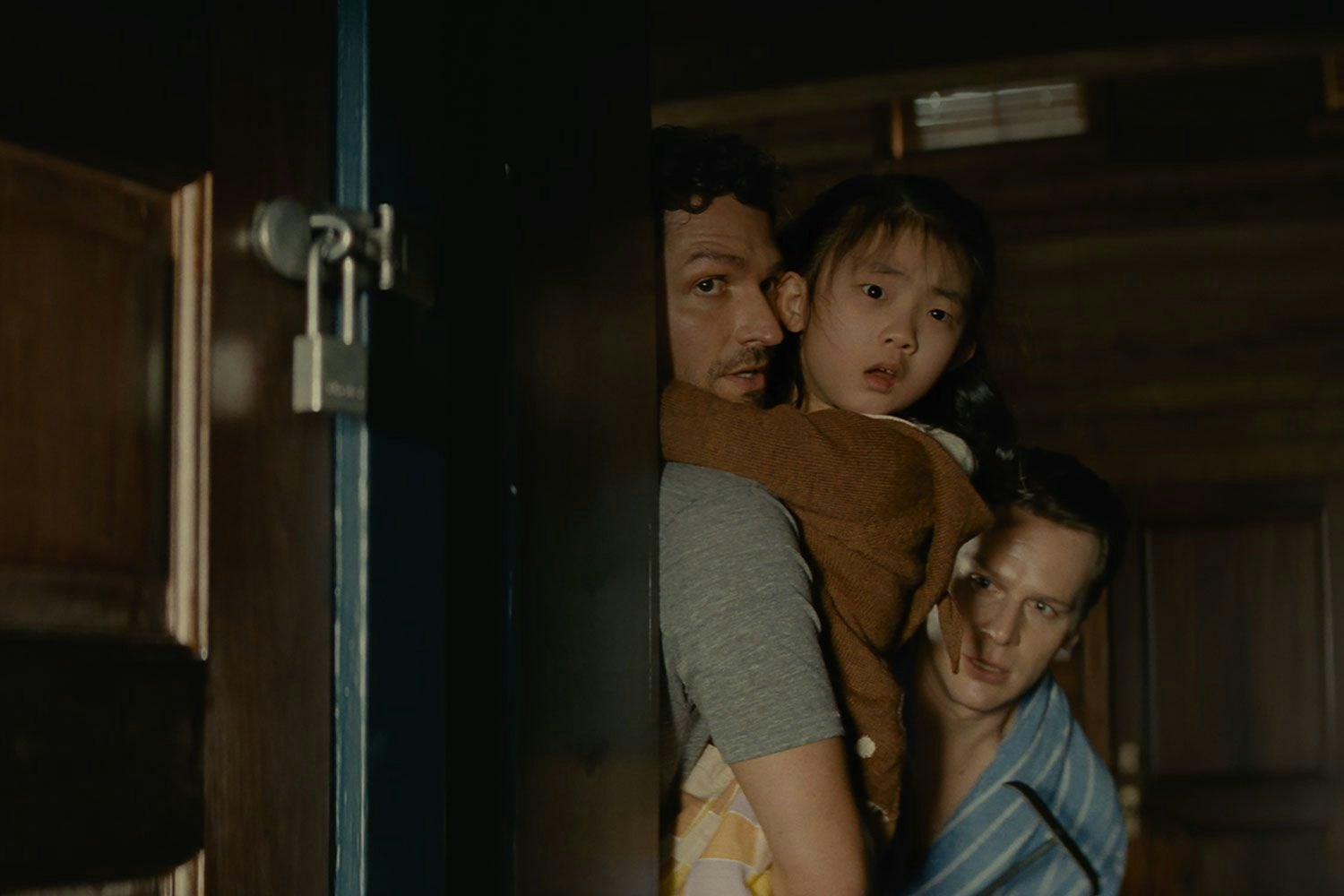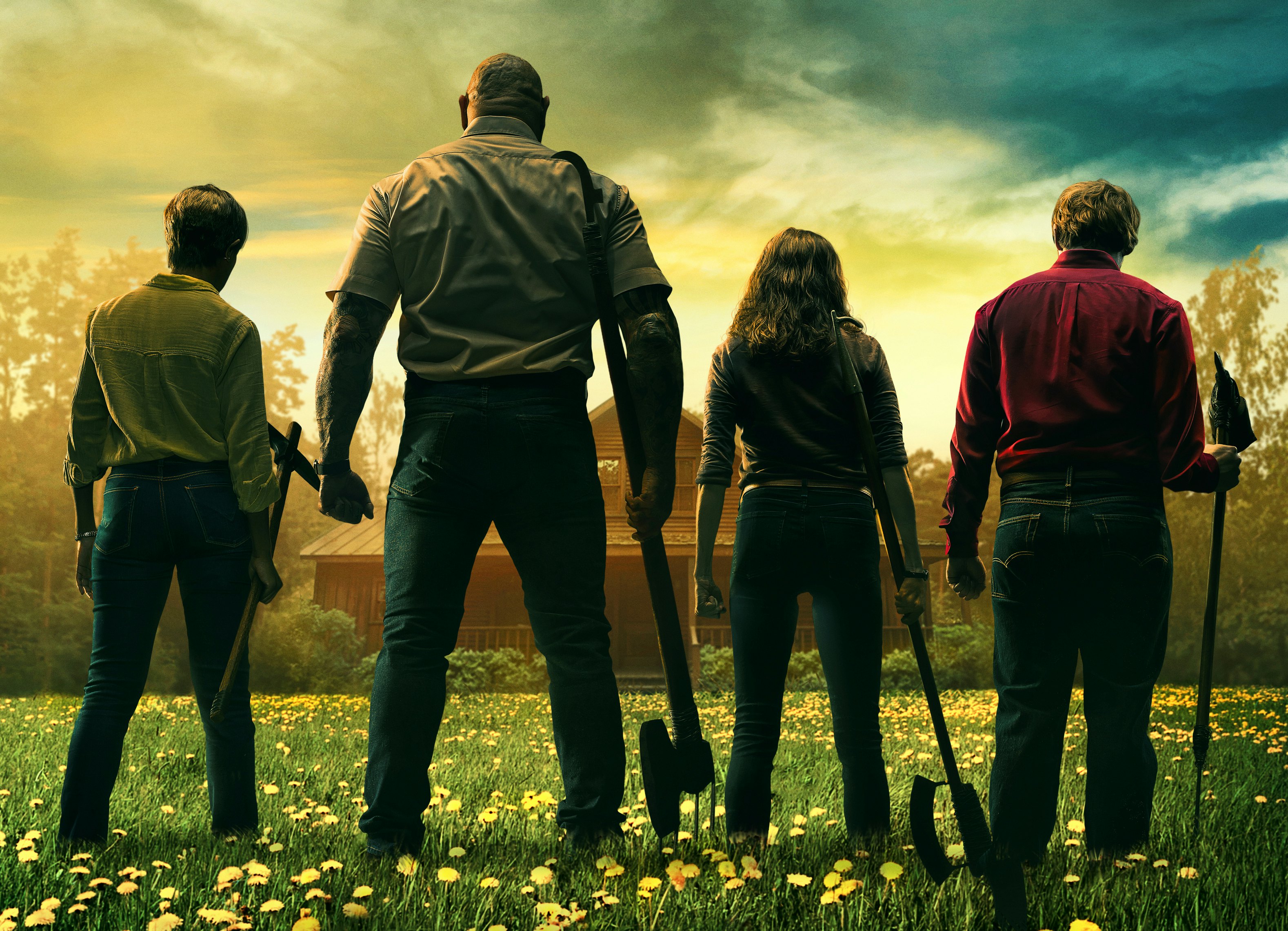
M. Night Shyamalan movies live or die by their twists.
At least, that’s the accepted thinking, based on the filmmaker’s famous (or infamous) inclination to include a jaw-dropping twist in most of his movies. The twist can shock, or baffle, or turn the movie’s entire narrative on its head — but if it’s unsatisfying, the entire film is written off. It’s a reputation that’s overshadowed Shyamalan’s whole career, and one that he’ll probably never fully escape. But refreshingly, with Knock at the Cabin, it seems that Shyamalan has outgrown the plot twist.
Based on Paul G. Tremblay’s 2018 novel The Cabin at the End of the World, Knock at the Cabin follows the story of a loving family — Eric (Jonathan Groff), Andrew (Ben Aldridge), and their adopted daughter Wen (Kristen Cui) — whose vacation at a remote cabin is interrupted by four strangers arriving at their door. Led by the hulking Leonard (Dave Bautista), the strangers Sabrina (Nikki Amuka-Bird), Adriane (Abby Quinn), and Redmond (Rupert Grint) insist that they are there to avert the apocalypse. But they need Eric, Andrew, and Wen’s help with a terrible decision: the three must decide which of them must be sacrificed to save all of humanity from dying in a series of world-destroying plagues.
And that’s it, there’s no twist. Instead, Knock at the Cabin is a straightforward exercise in nail-biting suspense, steered by a filmmaker at the height of his confidence in his craft, and powered by a tremendous antagonistic turn from Bautista, who gives the best performance of his career yet.
It’s clear this is Bautista’s movie from the opening moments, when he emerges from the woods to approach Wen, who’s collecting grasshoppers outside the cabin. Bautista’s Leonard first appears as just a blurry figure in the distance, before we cut to his feet, his boots stomping on the worn-down path like some ominous death knell, each heavy thump reverberating through the screen until it settles in your bones. Shot from afar, Bautista’s large physique feels inherently threatening, but Shyamalan chooses to mostly show him in extreme close-up, Bautista’s gentle, open face putting the audience — and Wen — at ease as he asks her about her grasshoppers and her family.
But then, things start to feel a little off. As Leonard and Wen’s conversation continues, each cut becomes a deeper Dutch angle. A wide shot of the woods distorts with a dolly zoom, and soon, three other people emerge from the woods, each carrying a strange, primitive weapon. Leonard apologizes to Wen “with all of my broken heart,” and she flees to the cabin, pulling her dads inside and insisting they lock the doors. And the unrelenting barrage of dread and suspense begins.

Shyamalan might have found his perfect collaborator in Bautista, who nails the tricky balance of earnest tone and stilted dialogue typical of the filmmaker’s movies, all while radiating a terrifying, unreadable fanaticism that feels equal turns compassionate and menacing. He’s a gentle giant who apologizes to his would-be victims and puts cartoons on for Wen, but he believes in his task with a religious fervor that makes his every action incomprehensible to everyone but him.
Shyamalan’s signature quirk of awkward dialogue, which is less pronounced here thanks to co-writers Steve Desmond and Michael Sherman, feels somehow natural coming from Bautista’s lips — Leonard’s words feel rehearsed because they are, his actions are practiced because he did. And despite the limitations of the character, Bautista manages to convey deep empathy and sadness with every word he utters; it feels like his short, heartbreaking scene in Blade Runner 2049 turned up to 11. This is a man given a terrible burden he wouldn’t wish on anyone, and Bautista sells that.
But Knock at the Cabin is not just Bautista’s movie. Amuka-Bird, Quinn, and Grint are all standouts as Bautista’s uncertain fellow horsemen of the apocalypse, with all of them a little apologetic, all of them scared. Grint especially, as the jittery, hotheaded wild card, nearly steals the scenes from Bautista a few times.
But if there’s anyone to hold a candle to Bautista, it’s Jonathan Groff and Ben Aldridge as Eric and Andrew, whose stubborn resistance to the strangers’ awful demands is only superseded by their unflagging loyalty to each other and Wen. Unlike the four strangers, Eric and Andrew are given the benefit of a character arc, with flashbacks to their lives together interwoven throughout the movie. It helps the two feel like the most fleshed-out and intensely human of Shyamalan characters, an achievement aided by the fact that Groff and Aldridge seem to have sidestepped the “awkward dialogue” requirements of his films.

Shyamalan hasn’t quashed all of his worst instincts — Knock at the Cabin feels almost unbearably earnest at times, and its messages are spelled out a little too obviously — but it does feel like he’s reached a new level of confidence as a filmmaker that he was just starting to gain with Old. Given a straightforward thriller like this, Shyamalan lets loose a little with his filmmaking style, the aforementioned Dutch angles and dolly zooms being only a few of the directorial tricks he uses to amp up the dread. It might be his most technically impressive film thus far, even if it’s not his most narratively exciting one.
Knock at the Cabin is a rock-solid thriller, but not an amazing one. Its Biblical apocalypse prevents it from playing as anything more than a parable, and limits it from reaching for any deeper meaning beneath the surface-level suspense. The latter makes some readings of the film’s ending as potentially insidious feel thin. But as a showcase for Shyamalan’s evolving abilities as a filmmaker, it does a great job. And even if Knock at the Cabin doesn’t live or die by a twist, it gets all the life it needs from a terrific, terrifying Bautista.
Knock at the Cabin opens in theaters on February 3.







